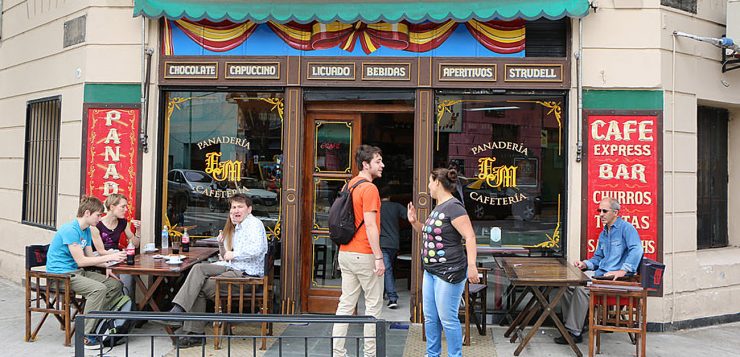LUNFARDO Y MODISMOS
One thing you learn right away studying, working, interning, or living abroad in Buenos Aires is how differently Argentines and Porteños speak! Aside from the jjjjjs in their accents and the voseo form of conjugation, Porteños (or native Buenos Aires residents) also are known for their specific slang. While every country, region, and city has their own modisms and slang that you learn to pick up, Buenos Aires has a particularly historic and playful lunfardo (slang).
Many people know that the best way to learn Spanish is to live in a Spanish speaking country, and we agree! Studying abroad in Buenos Aires gives you the opportunity to take Spanish classes while applying what you learn in the classroom to what you hear on the streets. Here’s some history on where the slang comes from, as well as a guide to some common expressions that you are likely to hear while you are studying in BA!
Lunfardo is said to have come to Buenos Aires at the end of the 19th century, about the same time as Italian immigrants were fleeing to Argentina to look for work. Because of this, lots of lunfardo is a mixture between Spanish and Italian, as well as carrying Gaucho and even African origins. Lunfardo spread first through the lower classes – particularly around Buenos Aires, and later to Rosario, Argentina, and Montevideo, Uruguay – but then began to be used by all class levels and cross racial, social, and gender divisions, particularly because it was, and still is, used in the lyrics of Argentina´s iconic tango music. Lunfardo is now integrated into conversational Spanish throughout Argentina and Uruguay, but the term is synonymous of ‘speech of Buenos Aires’
Lunfardo, like all slang, is dynamic and shifting all the time! There is always more to learn, hear, and wonder about. Here are some words, phrases, and terms that you can slip into conversations with porteños to give you that authentic spice:
- a full: overworked, busy, in a rush “estoy a full con la facultad”. A lot, packed with people, “cómo fue la fiesta?” “a full che”
- bárbaro: great, cool
- berretta: cheap or bad quality
- boludo/a: the term boludo/a can both be an insult (calling someone an idiot) and a term of endearment used among friends
- boludez: similar to the term “bull” in english, a task that’s easy to do or something you don’t want to do
- boludear: to joke around (“me estás boludeando”), to waste time
- hacerse el boludo: to act like an idiot
- boliche: dance club
- bondi: bus, slang for “colectivo”, the more common term for bus
- bronca: anger, frustration
- Darse bronca or me da bronca: used to say that something upsets you,
- buena onda: cool, can refer to a person, a place, an activity, etc.
- capaz: maybe, “capaz que si”
- careta: fake, from “cara” as if you have a mask on
- chabón: guy
- chamuyar: smooth talking, especially in romantic situations
- charlatán: chamuyero: used most often for a guy who hits on a lot of women by talking them up
- a show off/know-it-all, used similarly to chamuyero
- che: used as a colloquial phrase when talking to someone, often at the beginning of a sentence. “che, ¿cómo estás?”
- dale: like “ok”, but used in agreement. “¿querés ir al parque?” “¡dale!”
- estar en pedo: to be really drunk, to be in trouble (used like “I’m screwed”)
- fiaca: lazy
- forro/a: used also as an insult, like idiot
- huevos: literally means eggs, used like “balls” in English. Me costó un huevo y medio: more slang way of saying something was expensive, similar to the English saying “it cost me an arm and a leg”
- joda: a wild party
- guita: money, used like “cash”
- laburar: to work
- lunfardo: the argentine/rioplatense slang. Originated from the word “outlaw” because in the late 1890s and early 1900s the language was associated with prison speak
- luca: one thousand pesos, 1.000 pesos = 1 luca, 2.000 pesos = 2 lucas
- mango: Money, used like “bucks” in English. 1 peso = 1 mango, 2 pesos = 2 mangos
- medio: placed before adjectives to say “kind of” or “a little”. “a veces es medio difícil”
- ¡mira vos!: used commonly as “wow!” or literally “look at you!”
- mina: woman, originated as an offensive term but now used commonly
- un montón: a lot, a ton
- morfar: to eat
- morfi: food
- pelotudo: idiot
- pibe: a kid, child
- plata: money, used like “cash”
- posta: used in agreement or for emphasis, like “for real”
- puede ser: could be, maybe
- pucho: a cigarette
- que sé yo: I don’t know, what do I know
- quilombo: mess, much stronger expression than “lio” or “desastre”
- re-: really, very, used as a prefix to an adjective, “estoy recontento”
- subte: short for el subterraneo, which is the subway
- tal cual: exactly, used in agreement to a statement
- tener ganas: to be in the mood to do something, “yo tengo ganas de mirar una película”
- pilas: literally means batteries but is used as energy, intention, etc. Con pilas: with energy or excitement – “hay que hacerlo con pilas!”
- tipo: guy, dude, not used to address friends, sometimes in a negative tone.
- used as description or time: tipo can also be added to the end of sentences (mostly with times or numbers) to mean “around” “¿cuando nos juntamos?” “a las 8 tipo”
- trucho: fake, especially used for something counterfeit
- vesre: one tendency of lunfardo is to reverse syllables in words, for instance telo is the reverse of hotel, just as vesre is just a vesre version or reves
- viste: literally the you-preterite of ver, or “you saw”, but is used to say “you know?”
Rachel Sherman @ Mente Argentina








Discussion1 Comment
I live in Costa Rica, and we use at least half of these here! Many of them are Pan American, more “youth speak” than slang.